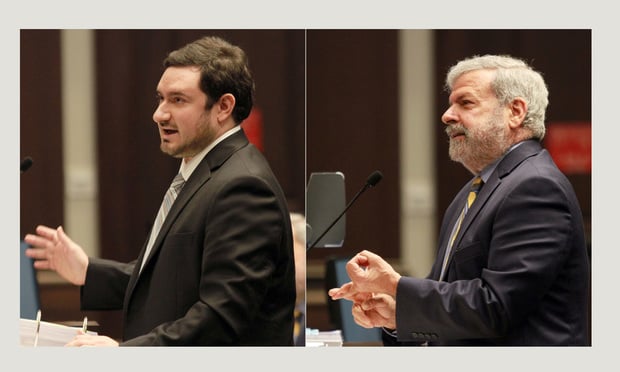Samuel Finds Himself in a New Place—in More Ways Than One
Don Samuel's many appearances before the high court have been for the appellant seeking a new trial or a reversal of a conviction. On Tuesday, at the high court's first oral arguments in the new Nathan Deal Judicial Center, Samuel was there for the first time representing the appellee.
January 16, 2020 at 03:17 PM
5 minute read
 Jason Rea (left) and Don Samuel. (Photos: John Disney/ALM)
Jason Rea (left) and Don Samuel. (Photos: John Disney/ALM)
Criminal defense attorney Don Samuel of Garland, Samuel & Loeb has argued before the Georgia Supreme Court many times, but this one was different.
Samuel has helped a long list of celebrity clients defeat murder charges. His most famous may be Jim Williams, the Savannah antiques dealer whose story was told in the book and movie "Midnight in the Garden of Good and Evil." Williams was tried four times on charges of shooting his assistant and lover Danny Hansford—played by a young Jude Law in the movie—before being acquitted in the last trial.
Samuel's many appearances before the high court have been for the appellant seeking a new trial or a reversal of a conviction. On Tuesday, at the high court's first oral arguments in the new Nathan Deal Judicial Center, Samuel was there for the first time representing the appellee.
Samuel's client, Antiwan Lane, was accused of hiring a hitman to kill Hector Gonzalez. The star witness against him was the admitted hitman, Kevin Stallworth, who testified that Lane hired him for $10,000. But Stallworth said he made a mistake and instead shot Gonzalez's cousin, Ivan Perez—"like five times," according to the state's brief—while Perez was waiting outside his cousin's apartment for Gonzalez to come home. Perez wanted to borrow his cousin's car. Stallworth drove up in a silver BMW he said was borrowed from Lane, shot and fled. But he dropped his phone. A witness picked it up and handed it over to the police, who tracked it to Stallworth and arrested him. Stallworth made a deal to plead guilty and testify against Lane.
Lane was convicted of murder and other charges in a trial before longtime DeKalb County Superior Court Judge Clarence Seeliger in April 2013. After the verdict, Seeliger sentenced Lane to life in prison without the possibility of parole.
But later, following a hearing and a review of new defense counsel's claims that the trial was unfair, Seeliger granted Lane's motion for a new trial. DeKalb County District Attorney Sherry Boston appealed Seeliger's order.
On Tuesday, assistant district attorney Jason Rea argued for the state, saying that whatever errors happened in the trial were harmless.
"We are asking today for the court to reverse the trial court's order of a new trial in this case," Rea said. "We believe the order is deficient."
Rea and Samuel clashed over whether the errors in the trial were harmless. A key issue was the testimony of a police detective corroborating the hitman's story with a hearsay account of another potential hitman—who had been shot and killed himself by the time of trial—saying Lane had tried to hire him to kill Gonzalez.
Besides being hearsay, it just wasn't true. "It was the exact opposite of the truth," Samuel said—with no argument from the state on that point. "The effect of that is it enhances Stallworth's credibility. Stallworth is a truth teller, right? And, second, it implicates Lane in a murder for hire. And both of them are a lie."
Another trial error Samuel alleged was the admission of similar transaction evidence of other hits that turned out to be totally unrelated to Lane.
The case brought up so many errors that the justices asked the lawyers for supplemental briefing on another question: whether Georgia should abandon its "cumulative error rule."
"The cumulative error rule, when it is enforced inflexibly, provides that all errors raised on appeal must be reviewed in isolation and considered separately in deciding whether the error warrants granting a new trial, either under the plain error, or harmless error tests," Samuel said in his supplemental brief. "This Court, therefore, should explicitly adopt a thoughtful, flexible approach that provides that blinders should never be worn by an appellate court: when the court determines that several errors rendered a trial unfair or resulted in a verdict for which there is a lack of confidence, then a new trial should be granted. When, on the contrary, there are numerous errors raised, none of which compounded another and none of which resulted in a trial that was unfair, the judgment should be affirmed."
Samuel called the rule "silly and impractical" in the brief and said it "does not reflect the reality of trials or appeals."
In person, Samuel told the justices the rule is "nothing to boast." He said he researched the subject and could not find another state or federal court that had such a rule.
In any case, Samuel argued that Lane should have a new trial.
Samuel also made an unusual admission. "I acknowledge that if he has a new trial, and it is a fair trial, it's possible Mr. Lane will be convicted again."
In support of his argument to throw out the rule against cumulative error, Samuel asked the justices to remember that the cumulative effect of errors is unfairness.
"Isn't that what this court does?" Samuel asked. "Decide whether there was a fair trial?"
The case is State v. Lane, No. S19A1424.
This content has been archived. It is available through our partners, LexisNexis® and Bloomberg Law.
To view this content, please continue to their sites.
Not a Lexis Subscriber?
Subscribe Now
Not a Bloomberg Law Subscriber?
Subscribe Now
NOT FOR REPRINT
© 2025 ALM Global, LLC, All Rights Reserved. Request academic re-use from www.copyright.com. All other uses, submit a request to [email protected]. For more information visit Asset & Logo Licensing.
You Might Like
View All
DC Lawsuits Seek to Prevent Mass Firings and Public Naming of FBI Agents
3 minute read

Apply Now: Superior Court Judge Sought for Mountain Judicial Circuit Bench
3 minute read
A Plan Is Brewing to Limit Big-Dollar Suits in Georgia—and Lawyers Have Mixed Feelings
10 minute readTrending Stories
- 1Thursday Newspaper
- 2Public Notices/Calendars
- 3Judicial Ethics Opinion 24-117
- 4Rejuvenation of a Sharp Employer Non-Compete Tool: Delaware Supreme Court Reinvigorates the Employee Choice Doctrine
- 5Mastering Litigation in New York’s Commercial Division Part V, Leave It to the Experts: Expert Discovery in the New York Commercial Division
Who Got The Work
J. Brugh Lower of Gibbons has entered an appearance for industrial equipment supplier Devco Corporation in a pending trademark infringement lawsuit. The suit, accusing the defendant of selling knock-off Graco products, was filed Dec. 18 in New Jersey District Court by Rivkin Radler on behalf of Graco Inc. and Graco Minnesota. The case, assigned to U.S. District Judge Zahid N. Quraishi, is 3:24-cv-11294, Graco Inc. et al v. Devco Corporation.
Who Got The Work
Rebecca Maller-Stein and Kent A. Yalowitz of Arnold & Porter Kaye Scholer have entered their appearances for Hanaco Venture Capital and its executives, Lior Prosor and David Frankel, in a pending securities lawsuit. The action, filed on Dec. 24 in New York Southern District Court by Zell, Aron & Co. on behalf of Goldeneye Advisors, accuses the defendants of negligently and fraudulently managing the plaintiff's $1 million investment. The case, assigned to U.S. District Judge Vernon S. Broderick, is 1:24-cv-09918, Goldeneye Advisors, LLC v. Hanaco Venture Capital, Ltd. et al.
Who Got The Work
Attorneys from A&O Shearman has stepped in as defense counsel for Toronto-Dominion Bank and other defendants in a pending securities class action. The suit, filed Dec. 11 in New York Southern District Court by Bleichmar Fonti & Auld, accuses the defendants of concealing the bank's 'pervasive' deficiencies in regards to its compliance with the Bank Secrecy Act and the quality of its anti-money laundering controls. The case, assigned to U.S. District Judge Arun Subramanian, is 1:24-cv-09445, Gonzalez v. The Toronto-Dominion Bank et al.
Who Got The Work
Crown Castle International, a Pennsylvania company providing shared communications infrastructure, has turned to Luke D. Wolf of Gordon Rees Scully Mansukhani to fend off a pending breach-of-contract lawsuit. The court action, filed Nov. 25 in Michigan Eastern District Court by Hooper Hathaway PC on behalf of The Town Residences LLC, accuses Crown Castle of failing to transfer approximately $30,000 in utility payments from T-Mobile in breach of a roof-top lease and assignment agreement. The case, assigned to U.S. District Judge Susan K. Declercq, is 2:24-cv-13131, The Town Residences LLC v. T-Mobile US, Inc. et al.
Who Got The Work
Wilfred P. Coronato and Daniel M. Schwartz of McCarter & English have stepped in as defense counsel to Electrolux Home Products Inc. in a pending product liability lawsuit. The court action, filed Nov. 26 in New York Eastern District Court by Poulos Lopiccolo PC and Nagel Rice LLP on behalf of David Stern, alleges that the defendant's refrigerators’ drawers and shelving repeatedly break and fall apart within months after purchase. The case, assigned to U.S. District Judge Joan M. Azrack, is 2:24-cv-08204, Stern v. Electrolux Home Products, Inc.
Featured Firms
Law Offices of Gary Martin Hays & Associates, P.C.
(470) 294-1674
Law Offices of Mark E. Salomone
(857) 444-6468
Smith & Hassler
(713) 739-1250






